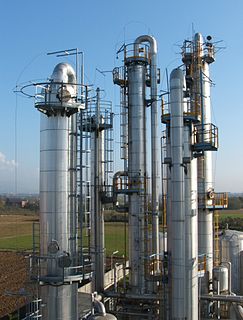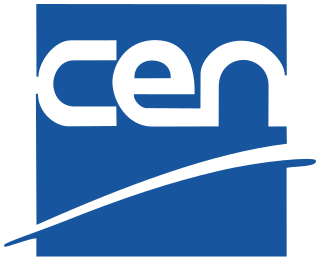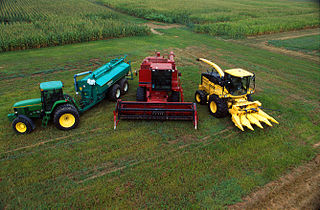Related Research Articles
Standardization or standardisation is the process of implementing and developing technical standards based on the consensus of different parties that include firms, users, interest groups, standards organizations and governments. Standardization can help maximize compatibility, interoperability, safety, repeatability, or quality. It can also facilitate commoditization of formerly custom processes. In social sciences, including economics, the idea of standardization is close to the solution for a coordination problem, a situation in which all parties can realize mutual gains, but only by making mutually consistent decisions.
In economics, industrial organization is a field that builds on the theory of the firm by examining the structure of firms and markets. Industrial organization adds real-world complications to the perfectly competitive model, complications such as transaction costs, limited information, and barriers to entry of new firms that may be associated with imperfect competition. It analyzes determinants of firm and market organization and behavior on a continuum between competition and monopoly, including from government actions.
Conformance testing — an element of conformity assessment, and also known as compliance testing, or type testing — is testing or other activities that determine whether a process, product, or service complies with the requirements of a specification, technical standard, contract, or regulation. Testing is often either logical testing or physical testing. The test procedures may involve other criteria from mathematical testing or chemical testing. Beyond simple conformance, other requirements for efficiency, interoperability or compliance may apply. Conformance testing may be undertaken by the producer of the product or service being assessed, by a user, or by an accredited independent organization, which can sometimes be the author of the standard being used. When testing is accompanied by certification, the products or services may then be advertised as being certified in compliance with the referred technical standard. Manufacturers and suppliers of products and services rely on such certification including listing on the certification body's website, to assure quality to the end user and that competing suppliers are on the same level.

An organization, or organisation, is an entity – such as a company, an institution, or an association – comprising one or more people and having a particular purpose.
In sales, commerce and economics, a customer is the recipient of a good, service, product or an idea - obtained from a seller, vendor, or supplier via a financial transaction or exchange for money or some other valuable consideration.

In the field of engineering, a chemical engineer is a professional, equipped with the knowledge of chemical engineering, who works principally in the chemical industry to convert basic raw materials into a variety of products and deals with the design and operation of plants and equipment. In general, a chemical engineer is one who applies and uses principles of chemical engineering in any of its various practical applications; these often include
- design, manufacture, and operation of plants and machinery in industrial chemical and related processes ;
- development of new or adapted substances for products ranging from foods and beverages to cosmetics to cleaners to pharmaceutical ingredients, among many other products ; and
- development of new technologies such as fuel cells, hydrogen power and nanotechnology, as well as working in fields wholly or partially derived from chemical engineering such as materials science, polymer engineering, and biomedical engineering.
A chief technical officer (CTO), sometimes known as a chief technology officer or chief technologist, is an executive-level position in a company or other entity whose occupation is focused on the scientific and technological issues within an organization.
New institutionalism or neo-institutionalism is an approach to the study of institutions that focuses on the constraining and enabling effects of formal and informal rules on the behavior of individuals and groups.

The European Committee for Standardization is a public standards organization whose mission is to foster the economy of the European Union (EU) in global trading, the welfare of European citizens and the environment by providing an efficient infrastructure to interested parties for the development, maintenance and distribution of coherent sets of standards and specifications.

Agribusiness is the business of agricultural production which involves the production, protection, sales and marketing of the product to satisfy the customers need. The term is a portmanteau of agriculture and business and was coined in 1957 by John Davis and Ray Goldberg. It includes agrichemicals, breeding, crop production, distribution, farm machinery, processing, and seed supply, as well as marketing and retail sales. All agents of the food and fiber value chain and those institutions that influence it are part of the agribusiness system.
The VDE e. V. is one of Europe’s largest technical-scientific associations with 36,000 members, including 1,300 corporate and institutional members and 8,000 students.
A standard operating procedure (SOP) is a set of step-by-step instructions compiled by an organization to help workers carry out routine operations. SOPs aim to achieve efficiency, quality output and uniformity of performance, while reducing miscommunication and failure to comply with industry regulations.

W. L. Gore & Associates, Inc. is an American multinational manufacturing company specializing in products derived from fluoropolymers. It is a privately held corporation headquartered in Newark, Delaware. It is best known as the developer of waterproof, breathable Gore-Tex fabrics.
The Defence Industry of Pakistan, under the Ministry of Defence Production, was created in September 1951 to promote and coordinate the patchwork of military production facilities that have developed since independence. The ministry also includes seven other specialized organizations devoted to research and development, production, and administration. Pakistan Navy is supported mainly by a facility at the Karachi Shipyard, which has limited production capacity. In 1987 development of a submarine repair and rebuild facility at Port Qasim was begun. By early 2000, in a joint project with China led to the development of the JF-17 Thunder fighter and the Al-Khalid Tank. Pakistan also has taken major steps to becoming self-sufficient in aircraft overhaul, modernization and tank and helicopter sales and a transfer of technology with France led to the construction of the Agosta B-90 Submarine in the late 1990s and early 2000s and is currently participating in many joint production projects such as Al Khalid 2, advance trainer aircraft, combat aircraft, navy ships and submarines. In 2016 the pakistani government managed to reduce its defence imports by 90%.
Business economics is a field in applied economics which uses economic theory and quantitative methods to analyze business enterprises and the factors contributing to the diversity of organizational structures and the relationships of firms with labour, capital and product markets. A professional focus of the journal Business Economics has been expressed as providing "practical information for people who apply economics in their jobs."

Midland University is a private Lutheran liberal arts university in Fremont, Nebraska. It has an approximate enrollment of 1,400 students on 33-acre (13 ha) campus. The university offers more than 30 undergraduate bachelor's degrees and three graduate master's degrees, including Master of Business Administration (MBA), Master of Education in Leadership, Master of Science: Adult and Organizational Learning, and Master of Athletic Training.
Entrepreneurship is the creation or extraction of value. With this definition, entrepreneurship is viewed as change, generally entailing risk beyond what is normally encountered in starting a business, which may include other values than simply economic ones.

Industrial engineering is an engineering profession that is concerned with the optimization of complex processes, systems, or organizations by developing, improving and implementing integrated systems of people, money, knowledge, information and equipment.

The Central Institute of Petrochemicals Engineering and Technology formerly Central Institute of Plastics and Technology is an autonomous institution under the Ministry of Chemicals and Fertilizers (India).

Nigeria–Spain relations are the bilateral and diplomatic relations between these two countries. Nigeria has an embassy in Madrid. Spain has an embassy in Abuja and a consulate-general in Lagos.
References
- ↑ DiMaggio, P.; Powell, W. W. (1983). "The iron cage revisited: Institutional isomorphism and collective rationality in organizational fields". American Sociological Review. 48: 148, 149. doi:10.2307/2095101.
| | This economics-related article is a stub. You can help Wikipedia by expanding it. |